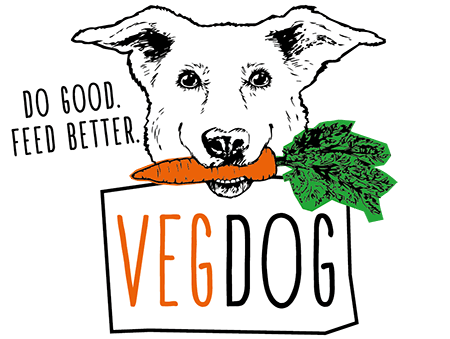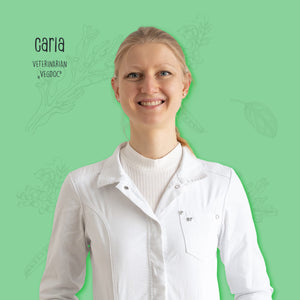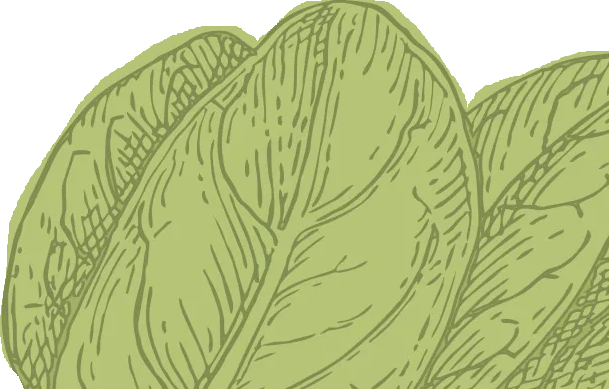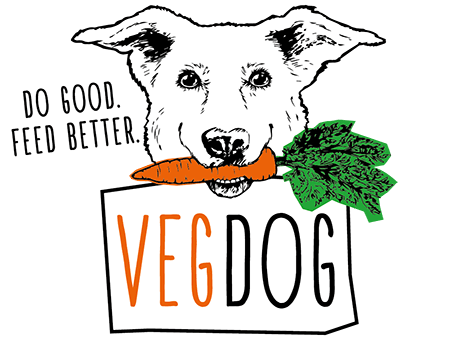
The importance of vegan complete food for dogs
Are you wondering which food is best for your furry friend? We present the complete food as a simple and healthy option!
In this article you will learn:
- What the term complete feed means
- Which dog food you need to be careful with
- What must be stated and contained in vegan complete feed
 Author: Lisa Walther
Author: Lisa Walther
Updated: 18.11.2024
Published: 21.02.2016
Dog nutrition is increasingly becoming the focus of owners. They are faced with an overwhelming selection of ready-made foods. The decision is often difficult. The question arises as to which can best provide the beloved furry friend with all the important substances. After a short research, it quickly becomes clear: it has to be a "complete feed"! According to feed law, this must provide the dog with all nutrients while providing adequate energy without causing a deficiency or excess. Single feeds, on the other hand, only consist of one ingredient. Complete feeds, on the other hand, are basically mixed feeds, which can consist of several single feeds and supplements, for example. If no additional information can be found, this even applies to dogs of all ages, including puppies and seniors. That sounds simple and straightforward - but it isn't!
The problem with compound feed
Unfortunately, more and more dog foods are being produced that deceive consumers about their balanced composition. The feed authorities responsible for monitoring the products on the market are unable to carry out the necessary checks. Black sheep are often only discovered when they are reported immediately. And there are more of these black sheep than one might fear. Cans of food are often labeled "complete feed" even though the composition is more than poor and malnutrition is inevitable. So how do you recognize a "complete feed" that lives up to its name?
What to look out for with complete feed:
Whether a complete food lives up to its name depends entirely on whether the composition can provide all the nutrients needed, as is the case with VEGDOG dog food . However, there are a few hurdles that need to be considered, especially in the vegan sector.
To make an assessment, look at the declaration on the can. Here you will find the wording "content of ingredients", which is a list of the nutrients determined in the laboratory using Weender analysis. These are crude protein, crude fat, crude fiber and crude ash, and the dry matter. The content of nitrogen-free extract substances (carbohydrates and plant-based structural substances, "Nfe") is also calculated. It should be noted that no information is given about the quality and origin of the nutrients. In addition, the values of the individual components always refer to the dry matter content. If you want to compare different types of food or get information about the actual nutrient content, you should always calculate the content in 100%.
The can also declares which ingredients were used (in descending order), but also which artificial substances were added to cover the nutritional needs.
Food declared as a "complete feed" must of course cover the required amount of protein. However, dogs do not need the protein itself, but rather certain essential amino acids. They cannot produce these themselves through metabolic processes in the body. They must be supplied through food. Different protein sources (e.g. soy and lupine) contain an individual amino acid profile, which means that an adequate supply cannot always be expected, especially in the vegan sector. Based on the experience gained from extensive laboratory analyses that we were able to carry out during the development of VEGDOG, we can assume that the supply of some artificial amino acids is essential. These must be noted on the label of the feed. There are 10 essential amino acids: arginine, histidine, isoleucine, leucine, lysine, methionine, phenylalanine, threonine, tryptophan and valine.
When feeding a "complete feed", you should always ensure that, in addition to meeting the actual needs of both major elements, the ratio of calcium and phosphorus is in the optimal range. For adult dogs, this should be between 1.3 and 2.1. Both minerals have a significant influence on the functions of the skeleton, among other things.
An important trace element that usually has to be artificially added to vegan “complete feed” is copper. A typical sign of a deficiency is the greying of pigmented hair (“copper glasses” around the eyes).
Another factor to consider is the vitamin D content, which puts many manufacturers of vegan "complete feeds" to the test. The usual plant-based ingredients contain heat-labile vitamin D2, which is destroyed during the manufacturing process. If D2 is listed as an additive, it is questionable whether the food is getting the optimal amount due to the heating during production. The stable vitamin D3 (which is also available in plant-based form and is therefore vegan) must be added and listed in the additives declaration. If this is not the case, the dog is likely to be undersupplied with this important vitamin. If asked, the manufacturer should be willing to provide information as to whether the D3 is of animal or plant origin.
The same applies to vitamin B12 and the breakdown products of amino acid metabolism, taurine and carnitine. These are only contained in very small quantities or not at all in plant-based foods. The absence of these important substances in a vegan dog food declared as a "complete feed" should make every pet owner sit up and take notice and reconsider using it.
It should also contain a suitable source of vital polyunsaturated fatty acids (especially EPA and DHA). Research groups are only slowly beginning to realize that these are essential for the dog's organism. However, they should definitely be present in the "complete feed". A popular source for non-vegan feed is fish oil. VEGDOG adds a very special form of algae that provides these important fatty acids on a plant basis. Manufacturers should be willing to answer questions about the fatty acid composition of their feed.
If you look at the label of a vegan dog food and see the note "complete feed" but no additives of the above-mentioned substances, you should refrain from feeding it alone and definitely add the necessary elements yourself. Unfortunately, practice shows that dog owners cannot always rely on the statements of the feed manufacturers and have to ensure that their diet is 100% tailored to their needs.
Checklist declaration of complete feed:
The following should be present on the food packaging:
- List of all ingredients used in descending order - based on quantity
- Content of ingredients with indication of crude protein, fat, fiber, ash and dry matter or moisture
- A source of essential fatty acids (especially EPA and DHA) must be identifiable; if necessary, the manufacturer must provide information on this and arrange for a laboratory analysis.
- additives per kg of feed
If these are completely missing, it can be assumed that it is not a “complete feed”
Vegan complete food must always contain the following ingredients:
- copper
- plant-based vitamin D3 (D2 is heat-labile!)
- vitamin B12
- taurine and L-carnitine
- with high probability various amino acids (due to a lack of studies, one can only assume basic requirements, which cannot be completely covered by the protein sources used, e.g. soya or lupine). VEGDOG, for example, adds in ADULT LENSES & MILLET :
- DL-methionine,
- L-threonine
- L-tryptophan
- L-Valine
- other macro and trace elements, as well as vitamins, depend on the raw materials used and their natural content, as well as the cooking losses that need to be taken into account. These can only be determined and compensated for in advance using laboratory analyses. Accordingly, these cannot be generalized.
Frequently Asked Questions (FAQ)
What is meant by complete feed?
Complete feeds are types of feed which, according to the feed law, provide nutritional needs that meet animal nutrition.
What is meant by feed materials?
In contrast to complete or mixed feed, single feeds are types of feed that only consist of one ingredient and therefore do not cover the needs or require supplements to cover the needs.
Is vegan dog food healthy?
Yes, there are several studies that prove that vegan dog food is healthy for dogs and can even be allergy-friendly! Try our allergy-friendly SENSITIVE LUPINE PROTEIN .








